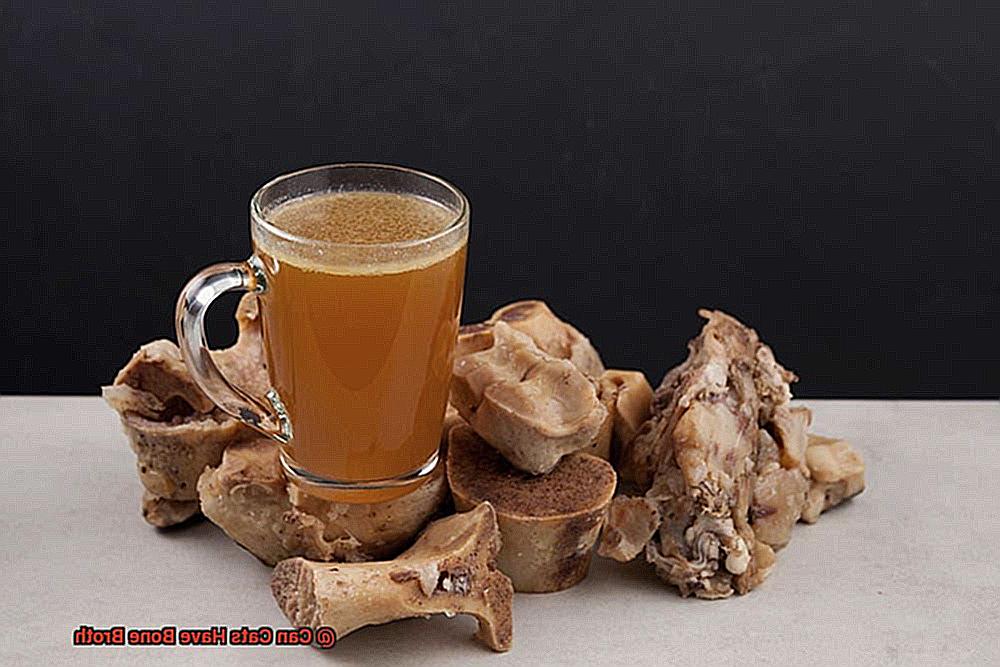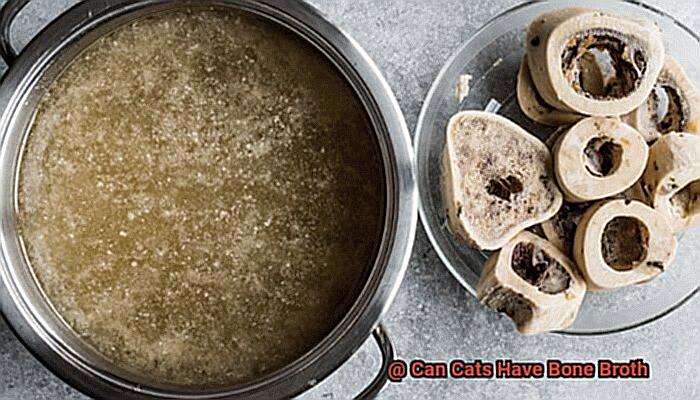Are you curious about the latest health craze, bone broth? Well, it’s not just humans who are jumping on this nutrient-packed bandwagon. Your feline friend can also benefit from this superfood. So, the question is: can cats have bone broth? The answer is a resounding yes.
Bone broth has become increasingly popular among pet owners as a fantastic source of nutrition for our furry companions. This liquid gold is packed with essential vitamins, minerals, and amino acids that your cat needs to thrive. With its high collagen content, glucosamine and chondroitin levels, and other vital nutrients, bone broth can help promote joint health, aid digestion, and boost your cat’s overall well-being.
But wait. Not all bone broths are created equal. Beware of store-bought options that may contain additives like salt or other flavor enhancers that could be harmful to your cat. It’s always best to make your own at home to ensure that you’re feeding your feline friend only the best ingredients.
In this blog post, we’ll delve deeper into the benefits of bone broth for cats and provide you with an easy-to-follow recipe to make your own at home. So let’s get started and learn how this delicious elixir can help keep your beloved kitty healthy and happy.
What is Bone Broth?
Look no further than bone broth. This savory liquid, enjoyed by humans for centuries, is made by simmering animal bones, vegetables, and herbs for several hours. The result is a nutrient-packed liquid that is rich in vitamins, minerals, and amino acids.
When it comes to selecting bones for your cat’s broth, opt for safe options such as poultry, beef, or fish bones. Not only do these bones offer a delicious flavor, but they are also an excellent source of collagen, gelatin, and amino acids that support healthy bones, joints, skin, and gut health.
Speaking of gut health, bone broth can work wonders for cats with upset stomachs. The gelatin in the broth can help soothe and heal their digestive system while the amino acids support the growth and repair of the gut lining. Additionally, bone broth can provide essential nutrients like calcium, magnesium, and potassium to help boost your cat’s immune system.
For older cats or those with arthritis, bone broth may be particularly beneficial. The collagen in the broth can help reduce inflammation and improve joint mobility, helping to keep your furry friend feeling spry and agile.
Can Cats Have Bone Broth?

Bone broth has become a popular trend in recent years as it is packed with essential nutrients and minerals that are beneficial for human health. But what about our feline friends? Can cats have bone broth?
As an expert in this area, I can confidently say that yes, cats can safely consume bone broth. However, it’s crucial to consider a few important factors before serving it to your kitty.
Firstly, not all bone broths are created equal. Some may contain harmful ingredients like onions or garlic that are toxic to cats. Therefore, always read the ingredient list carefully before feeding bone broth to your feline companion. It’s vital to ensure that the broth is made with safe ingredients and is free from any harmful substances.

Another crucial consideration is the source of the bones used to make the broth. Conventionally-raised animals may contain antibiotics or hormones that could be harmful to your cat. Opt for bones from grass-fed or organic animals when making bone broth for your cat.
When introducing bone broth to your cat’s diet, start slowly and in small amounts. Although bone broth provides many health benefits like soothing upset stomachs, boosting immunity, and aiding joint mobility for older cats, too much too soon could cause digestive upset. Gradually increase the amount over time and monitor your cat’s reaction.
Benefits of Bone Broth for Cats
That’s why bone broth might be the perfect addition to your kitty’s diet. This popular health trend isn’t just for humans; cats can also reap the benefits of this nutrient-rich broth.
Bone broth is made by simmering bones and connective tissue in water for an extended period, allowing for the release of collagen, amino acids, and minerals. The result is a broth that packs a powerful punch of health benefits that can help your cat feel her best.
One of the most significant advantages of bone broth for cats is its ability to support joint health. As your cat ages, she may experience joint pain and stiffness, which can make it challenging to move around comfortably. The collagen in bone broth provides the necessary building blocks for cartilage and other connective tissues, helping to support healthy joints.
But bone broth doesn’t stop there; it can also aid in digestion and promote a healthy gut. The gelatin in bone broth soothes and heals the digestive tract, reducing inflammation and promoting the growth of beneficial bacteria. This can be especially helpful for cats with inflammatory bowel disease or other digestive issues.
In addition to its joint health and digestive benefits, bone broth can also improve your cat’s overall health and well-being. The amino acids in bone broth are crucial for maintaining healthy skin, hair, and nails. They also play a vital role in supporting the immune system, helping to fight off infections and illnesses.
Before introducing any new food or supplement into your cat’s diet, it’s essential to consult with a veterinarian. Additionally, it’s crucial to ensure that any commercially available bone broth is free from harmful additives such as onion or garlic, which can be toxic to cats.
How to Feed Bone Broth to Your Cat
Bone broth could be the solution you’re looking for. But before you start pouring it into your cat’s bowl, there are a few things you need to know. Here are five tips on how to safely and effectively feed bone broth to your cat.
Start Slowly
If you’re introducing bone broth to your cat for the first time, it’s important to start slowly. Cats can be picky eaters, so don’t be surprised if they turn their nose up at it initially. Begin by adding a small amount of bone broth to their food and gradually increase the quantity over time.

Choose High-Quality Bone Broth
When it comes to choosing bone broth for your cat, quality matters. Make sure you select a high-quality bone broth that is free from any additives or preservatives. Additionally, look for bone broth that is specifically made for cats, as other types may contain harmful ingredients.
Use Bone Broth as a Topper
One of the easiest ways to add bone broth to your cat’s diet is by using it as a delicious topper for their regular food. Pour a small amount over their food, mix it in, and watch them enjoy their meal.
Serve Bone Broth as a Treat
Another way to incorporate bone broth into your cat’s diet is by serving it as a refreshing treat. Freeze small amounts in ice cube trays and give them to your cat on hot days. Not only will it help them stay hydrated, but it will also provide some extra nutrients.
Don’t Overdo It
While bone broth can be beneficial for your cat’s health, moderation is key. Too much bone broth can cause digestive issues for your cat, so use it as a supplement or treat rather than as a main source of nutrition.
Possible Side Effects of Feeding Bone Broth to Cats
One increasingly popular trend is feeding cats bone broth as a way to add nutrients and flavor to their diet. However, before you start adding bone broth to your cat’s food bowl, it’s essential to be aware of potential side effects that it may cause.
One of the most significant side effects of feeding bone broth to cats is gastrointestinal upset. This may include vomiting, diarrhea, or constipation. The high protein content in bone broth can also cause dehydration in some cats, so it’s crucial to ensure that they are drinking enough water.
Another potential risk of feeding bone broth to cats is bacterial contamination. If not prepared and stored correctly, homemade bone broth may contain harmful bacteria such as Salmonella or E. Coli, which can cause severe illness in cats. Using only high-quality ingredients and following proper food safety guidelines when making bone broth for your cat is crucial.
Lastly, it is essential to consider your cat’s health condition before introducing bone broth into their diet. Cats with kidney disease or other renal issues may not be able to tolerate the high levels of protein in bone broth. It’s crucial to consult with your veterinarian before introducing any new food into your cat’s diet.
4zhiaZtXYe8″ >
Conclusion
In conclusion, bone broth isn’t just a health trend for humans; it can also benefit our feline friends. It’s packed with essential vitamins, minerals, and amino acids that cats need to thrive. Bone broth can aid digestion, boost immunity, promote joint health, and improve overall well-being in cats. However, it’s crucial to ensure that the broth is made with safe ingredients and free from harmful substances.
When introducing bone broth to your cat’s diet, start slowly and in small amounts. Gradually increase the amount over time while keeping an eye on your cat’s reaction. Additionally, consult with a veterinarian before introducing any new food or supplement into your cat’s diet.
The popularity of feeding bone broth to cats as a way of adding nutrients and flavor to their diet has increased significantly. However, it’s vital to be aware of potential side effects such as gastrointestinal upset or bacterial contamination if not prepared and stored correctly. Therefore, using only high-quality ingredients and following proper food safety guidelines when making bone broth for your cat is crucial.
Overall, bone broth can be an excellent addition to your kitty’s diet if introduced safely and in moderation while considering their health condition. So why not try making some homemade bone broth for your furry companion today?







